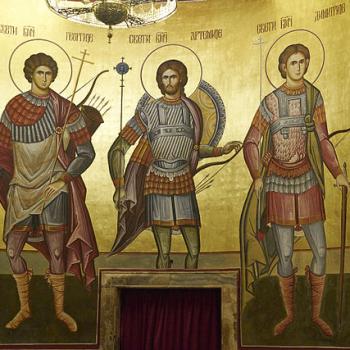Anyone who seriously studies the Bible for any length of time comes to a point, I suppose, where he or she must say: “I just don’t know concerning this point of doctrine.” Or this element of the Faith, or this particular tile in the mosaic of my theology. In fact, it may so happen that one’s field of “unknowing” grows over time, and actually increases with biblical study. It has happened in my own experience, and I’m beginning to suspect that this expansion of uncertainty may parallel and accompany a similar growth of personal humility (at least I hope so in my own case).
Now of course I’m not talking about the fundamental pillars of Christianity: when it comes to the core beliefs I find that belief actually increases. I am more firmly convinced of the key doctrines than ever. I have no doubts about the Virgin Birth, the Incarnation, the Resurrection, Christ’s substitutionary payment through death for my sins, and so forth. The basic elements found in any elementary catechism of the Faith — whether Catholic, Protestant, or Eastern Orthodox — I subscribe to without hesitation.
I find room for a healthy agnosticism, however, in those details where the devil is said to reside. I would never suffer martyrdom, for example, for the doctrine of premillennial dispensationalism, and neither would I for post- or amillennialism, or any possible configuration of dispensationalism. Any one of those formulations could certainly be true, and i am always willing to be convinced with scripture. But at the moment I just don’t know which one is accurate, and I have certainly spent a good portion of my life studying the issue. My point here is that it is possible for fully-informed Christian scholars and Bible students to differ on very important tenets, and to produce reams of evidence for each position.
That being the case, I settle back in my chair and relax into a comfortable agnosticism. Whether the Rapture will occur or not — whether past ages fulfill the prophecies of Revelation or they await a future consummation — these and similar points of contention I leave to those combatants who enjoy the clang and din of swords clashing about in the fog of war. And copious fog I certainly find in the world of disputatious exegesis. I will brandish my sabre in defense of Mere Christianity, but not on behalf of either partial or extreme preterism. Because (in spite of my leanings one way or the other) I simply don’t know when it comes to nonsalvific subdivisions of the catechism.
I know that Simon Peter tells us to be ready to give an answer to everyone who asks about the reasons for our hope. And Paul often tells his readers that he doesn’t want them to be ignorant of certain crucial details of the Faith. But I’m afraid his explanations sometimes lead to opposing schools of interpretation. And if none of the schools convinces me with its arguments, then I’m perfectly comfortable in my chair of reverent, pious, and (I hope) humble agnosticism.
















